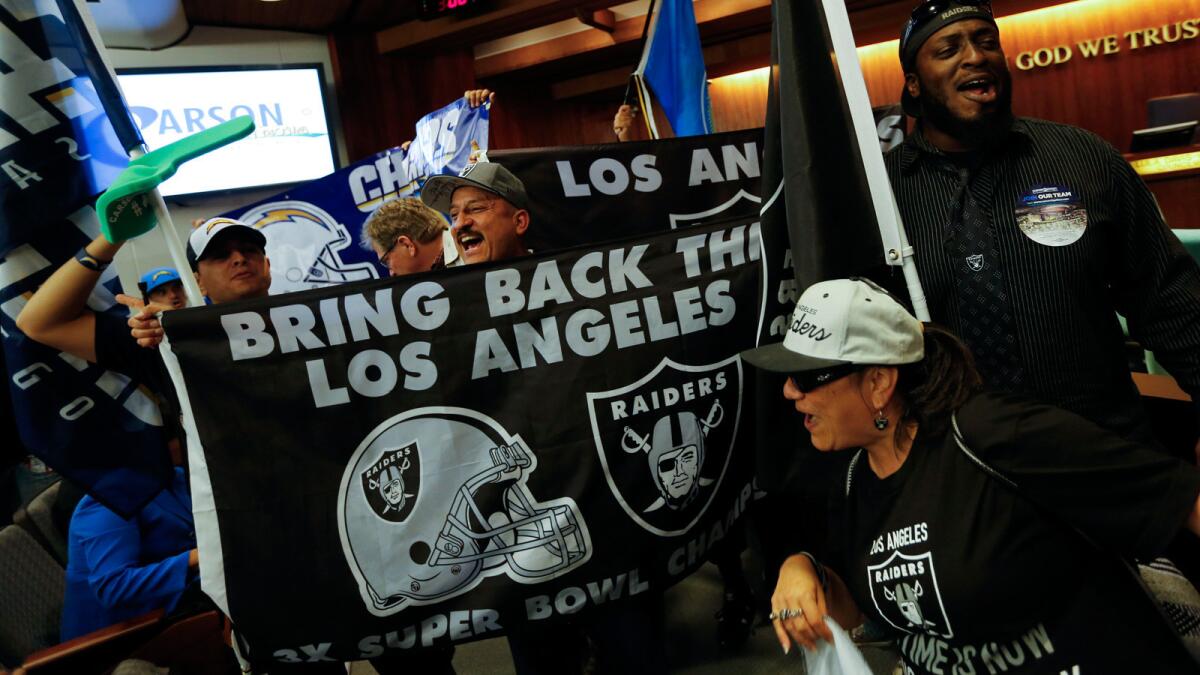Carson City Council gives unanimous approval to NFL stadium

The Carson City Council unanimously approved a privately financed stadium for the San Diego Chargers and Oakland Raiders on Tuesday night, barely two months after the public announcement of the $1.7-billion project.
“There are two things we need in California: rain … and football,” Carson Mayor Albert Robles said after the 3-0 vote. “And football is coming to Carson!”
Roars from jersey-wearing fans in the cramped council chambers followed the mayor’s words. The crowd quickly broke into a chant: “Bring them back! Bring them back!”
The decision was the same as that of a competing project in Inglewood, hoping to end the NFL’s two-decade absence from the Los Angeles area.
In February, Inglewood’s City Council adopted a ballot initiative for the $1.86-billion stadium as part of a sprawling mixed-use development backed by billionaire St. Louis Rams owner Stan Kroenke and Stockbridge Capital.
Now both would-be stadiums have local approval. Representatives of the projects will update a committee of NFL owners on their progress Wednesday during a meeting in New York.
Supporters of the Carson project needed just eight days in March to collect more than 15,000 signatures in support of their ballot initiative, almost twice the number required.
Like Inglewood, Carson’s City Council had the option of adopting the initiative or scheduling a public vote in July or August. The prospect of transforming the long-vacant former municipal landfill site next to the 405 Freeway into a 70,000-seat stadium proved too tempting to delay.
The ballot initiative process, followed by a council vote, allowed both proposals to skip lengthy environmental reviews.
The standing-room only council meeting Tuesday resembled a pep rally. Team officials, union leaders and fans in Chargers and Raiders jerseys all urged the council to approve the stadium. There was no significant opposition.
“We don’t need a vote,” said Felix Hernandez, dressed in the black No. 81 jersey of Raiders Hall of Fame receiver Tim Brown. “The community has spoken. Football needs to come back to Los Angeles.”
But behind the jubilation, public details about the project remained in short supply.
Carson officials acknowledge that much of the deal with the developers will be negotiated in the coming months. Tuesday’s vote is but one step.
The 26-page initiative petition pledged that no tax dollars would be used, but contained few specifics about the stadium. Goldman Sachs will lead the investment project, with personal seat licenses projected to account for about half of the cost.
A city-funded report released over the weekend repeatedly referenced the lack of detail: “As of the date of completion of this Report, no official project design documents have been provided by the Stadium Developer.” That report also raised concerns about construction noise and finding another 16,000 off-site parking spots.
While the report estimated that a one-team stadium could hurt Carson’s budget because the plan would imperil $1.4 million in federal housing funding, AECOM consultant David Stone said Tuesday that estimate was too conservative and that housing could easily be built elsewhere.
“I think this is a good deal for the city,” Stone said.
The consultant projected a one-team stadium would boost city revenue by $800,000 in its first year and $168 million over 40 years.
“This is an investment in our children and our children’s children,” councilman Elito Santarina said.
The complex plan creates a new city agency and includes a three-way land deal between the 168-acre property’s current owner, Starwood Capital, the Chargers and Carson. The Chargers’ purchase of the land — the site of years of failed developments that include a shopping mall and a professional football stadium — is scheduled to close at the end of the month.
There are environmental considerations, too. Remediation measures for the parcel that sits above deposits of oil, solvents and heavy metals are about 80% complete and need another year to finish.
Both the Chargers and Raiders continue to pursue stadiums in their current cities. But Jeffrey Pollack, a special advisor for the Chargers, insisted the franchise is serious about the Carson plan.
“We are excited about Carson as a shared solution,” Pollack told the council.
Anthony Manolatos, spokesman for the Citizens Stadium Advisory Group in San Diego, put the decision in the hands of Chargers owner Dean Spanos.
“There will be a path to a new stadium here,” Manolatos said in a statement. “It sounds like there will be one in L.A., too. If so, it will be up to Mr. Spanos to decide if he wants a new stadium in San Diego or Los Angeles.”
As the cheers died down in Carson, Robles said that given the more than 15,000 signatures gathered and the vocal support Tuesday, the City Council had a simple choice.
“They want this,” he said. “Why delay the inevitable?”
Follow Tim Logan on Twitter @bytimlogan
Follow Nathan Fenno on Twitter @nathanfenno
More to Read
Go beyond the scoreboard
Get the latest on L.A.'s teams in the daily Sports Report newsletter.
You may occasionally receive promotional content from the Los Angeles Times.












